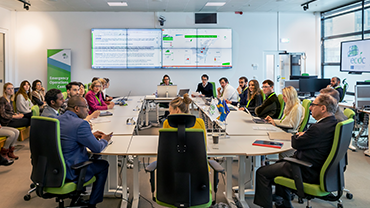Infodemic management during health emergencies: An interview with Thanas Goga
Thanas Goga is a specialist in Risk Communication, Community Engagement and Infodemic Management (RCCE-IM) at the WHO Health Emergencies Balkan Hub, WHO Regional Office for Europe. With over 25 years’ experience in public health and risk communication, he has led RCCE-IM strategies during disease outbreaks, humanitarian crises and refugee health emergencies, advising governments, international organisations, and academia.
What exactly is an "infodemic," and why is it so challenging to manage during public health crises?
An infodemic refers to a situation where there is an excess or void of information—some of which could be accurate, while a significant portion is false or misleading. This phenomenon occurs both online and offline during acute public health events, and it undermines trust in vital health services.
Misinformation complicates the public’s ability to identify reliable health information and can have severe consequences for well-being. During an emergency, people are more vulnerable to false information, and we have seen its impact during the COVID-19 pandemic, the Ukrainian refugee crisis, and various public health emergencies such as earthquakes, wildfires, and outbreaks.
Misinformation not only makes it difficult for people to discern accurate facts but also tends to spread faster than reliable information.
One of the key lessons we learned the hard way during the COVID-19 pandemic and other public health emergencies is that managing rumours and misinformation saves lives.
As a public health authority, which key stakeholders should you collaborate with to develop and implement an effective infodemic strategy and plan?
Collaboration is crucial to building trust between public health institutions and the communities they serve. Government bodies and health authorities are responsible for providing health services and developing policies. Healthcare workers, recognised as one of the most trusted sources of information, play a critical role. Journalists and media outlets are also key in disseminating factual public health messages. In addition, civil society organisations, which lie at the heart of community response, are vital. It is also important to engage community leaders, activists, role models, and influencers to ensure that communities are meaningfully engaged.
Bringing all these diverse stakeholders together in a systematic way is essential to combating misinformation, building, restoring and maintaining trust between the public and health authorities. By building trust, RCCE-IM enables and empowers individuals and communities to take informed decisions to protect their health from emergencies
The EU Initiative on Health Security aims to enhance regional collaboration and capacity building across the EU's neighbourhood regions. What role does regional collaboration play in addressing and managing infodemics?
Regional and international collaboration is extremely valuable. Such efforts enable us to build capacities and acquire skills that may not be developed locally. They provide opportunities to share the tools we are developing with partners like ECDC, UNICEF, and other partners, and to gather lessons learned from diverse experiences. Collaborative workshops and platforms - like the one we had here in Tunisia organised under the EU Initiative on Health Security - also help us build evidence to improve our responses over time. Moreover, they allow us to establish alliances and networks, facilitating the sharing of knowledge, skills, and research—an invaluable asset when managing public health.
If you could leave participants with one key takeaway from this training on infodemic management, what would it be?
While the tools, systems, and frameworks that work in one context may differ from those effective elsewhere, ultimately everything comes down to trust—trust in communities, trust in institutions, and trust in the media. If we can develop a robust method for building, restoring, and maintaining trust, regardless of where we are located, then we have a winning formula for managing infodemics.







